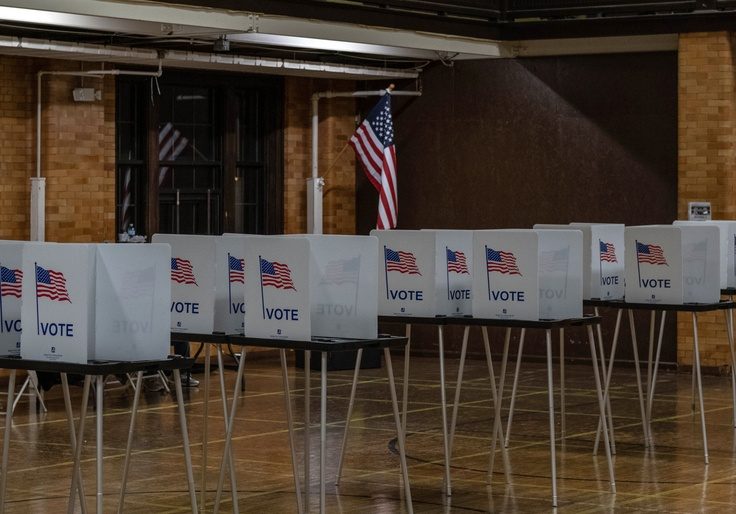A battery of lawsuits from the Trump campaign in battleground states is not likely to tip the outcome of the election.
The multi-pronged legal attack in Pennsylvania, Michigan, and Georgia does not involve issues that are likely to change vote tallies. The campaign's lawsuits have mostly involved modest claims that seek to ensure election procedures are followed. The actions do not seek to invalidate large numbers of votes or stop the canvassing process.
A dispute over a grace period for mail-in ballots in Pennsylvania is currently pending before the Supreme Court, but it is not clear that the votes in question will be decisive to the outcome in the Keystone State. All told, apart from the dispute over Pennsylvania's post-Election Day ballots, the Trump campaign does not have an obvious path for the Supreme Court showdown President Donald Trump advocated on election night.
The Trump campaign registered a victory in Pennsylvania Thursday, where it claimed Republican election monitors have not been able to closely watch the canvassing in Philadelphia, a Democratic stronghold.
Lawyers for Philadelphia argued that the mere presence of Republican observers in canvassing centers was sufficient under Pennsylvania law. The Trump campaign countered that their observers must have a meaningful ability to scrutinize the process and criticized election officials for configuring tables and other items to hinder observation. A Pennsylvania appeals court sided with Trump, saying election law requires vote counters to give Trump's watchers some "observational leeway to ascertain sufficient details of the canvassing process."
Philadelphia officials appealed to the state's highest court, but a decision has not yet come down. Trump campaign lawyer Pam Bondi said Thursday night that officials in Philadelphia are not complying with the appeals court order, so they will file a lawsuit in federal court.
Trump campaign lawyers also sued Michigan secretary of state Jocelyn Benson (D), claiming that GOP vote challengers were being kept away from absentee vote counting boards and surveillance video of ballot drop boxes. The Trump plaintiffs named only one GOP challenger allegedly kept away from the canvassing process and did not explain the circumstances for his removal, nor did they connect the incident to a broader pattern of malfeasance.
In a Thursday-afternoon hearing, Michigan Court of Claims judge Cynthia Stephens said she will dismiss the Trump campaign's lawsuit in a written decision by Friday afternoon. Stephens said the suit lacked specificity, and it seemed to her that the campaign was suing the wrong person. Rather than bringing a suit against Benson, Stephens said the campaign should have filed against local election officials, who are legally empowered to give the campaign the access it was allegedly denied. She also noted that the absentee vote canvass has effectively been completed.
Events were similar in Georgia, where Republican vote-watchers came forward and raised concerns that about 50 late-arriving absentee ballots had been mixed with lawful votes in Democratic Chatham County. They sought an order confirming that tardy votes cannot be counted under Georgia law.
Lawyers for the county countered that the contested votes were actually valid ones that were set aside while officials confirmed they were legitimate. During a Thursday-morning hearing, Superior Court judge James Bass found no evidence of illegal commingling and dismissed the case.
The Trump campaign has also asked the Supreme Court for permission to take over a lawsuit first raised by Pennsylvania Republicans involving mail-in ballots that arrive after Election Day. The Court asked Democrats to respond to Trump's request by 5:00 p.m. Thursday.
Pennsylvania's highest court directed that any ballot received by Friday, Nov. 6, should be counted, unless it appears likely that the ballot was put in the mail after Election Day. Republican leaders first asked the Supreme Court to put that decision on hold, then asked the justices to take the case and decide it in full before Election Day.
A short-handed Court denied both requests but left open the possibility that the justices could revisit the issue later. Lawyers for the state requested that post-Election Day ballots be segregated from all other votes in case they are subject to further litigation.
It's not clear how many mail-in votes have arrived since Tuesday night, nor is it obvious that one candidate would be able to overcome the winner's margin of victory on the strength of those votes. Pennsylvania secretary of state Kathy Boockvar (D.) said Thursday night that very few ballots have arrived since Election Day, and she expects to see only a "fraction" of the 60,000 late-arriving ballots cast in the June primary.
The Trump campaign has also announced plans to file a lawsuit in Nevada, where Joe Biden is clinging to a narrow lead. No action had appeared by press time. Canvassing in Nevada is expected to continue well into the weekend.
